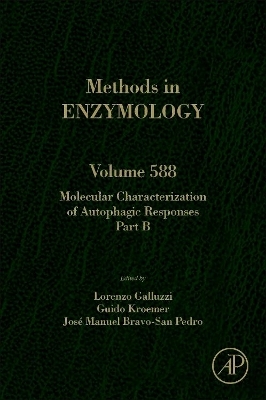
Molecular Characterization of Autophagic Responses Part B
Academic Press Inc (Verlag)
978-0-12-809674-1 (ISBN)
Autophagy is an evolutionarily conserved mechanism for the lysosomal degradation of superfluous or dangerous cytoplasmic entities, and plays a critical role in the preservation of cellular and organismal homeostasis. Monitoring the biochemical processes that accompany autophagy is fundamental for understanding whether autophagic responses are efficient or dysfunctional.
Lorenzo Galluzzi is Assistant Professor of Cell Biology in Radiation Oncology at the Department of Radiation Oncology of the Weill Cornell Medical College, Honorary Assistant Professor Adjunct with the Department of Dermatology of the Yale School of Medicine, Honorary Associate Professor with the Faculty of Medicine of the University of Paris, and Faculty Member with the Graduate School of Biomedical Sciences and Biotechnology of the University of Ferrara, the Graduate School of Pharmacological Sciences of the University of Padova, and the Graduate School of Network Oncology and Precision Medicine of the University of Rome “La Sapienza. Moreover, he is Associate Director of the European Academy for Tumor Immunology and Founding Member of the European Research Institute for Integrated Cellular Pathology. Galluzzi is best known for major experimental and conceptual contributions to the fields of cell death, autophagy, tumor metabolism and tumor immunology. He has published over 450 articles in international peer-reviewed journals and is the Editor-in-Chief of four journals: OncoImmunology (which he co-founded in 2011), International Review of Cell and Molecular Biology, Methods in Cell biology, and Molecular and Cellular Oncology (which he co-founded in 2013). Additionally, he serves as Founding Editor for Microbial Cell and Cell Stress, and Associate Editor for Cell Death and Disease, Pharmacological Research and iScience. Guido Kroemer got his M.D. in 1985 from the University of Innsbruck, Austria, and his Ph.D. in molecular biology in 1992 from the Autonomous University of Madrid, Spain. He is currently Professor at the Faculty of Medicine of the University of Paris Descartes/Paris V, Director of the INSERM research team ‘Apoptosis, Cancer and Immunity’, Director of the Metabolomics and Cell Biology platforms of the Gustave Roussy Cancer Campus, and Practitioner at the Hôpital Européen George Pompidou (Paris, France). He is also the Director of the Paris Alliance of Cancer Research Institutes (PACRI) and the Labex 'Immuno-Oncology'. Dr. Kroemer is best known for the discoveries that mitochondrial membrane permeabilization constitutes a decisive step in regulated cell death; that autophagy is a cytoprotective mechanism with lifespan-extending effects; and that anticancer therapies are successful only if they stimulate tumour-targeting immune responses. He is currently the most-cited cell biologist in Europe (relative to the period 2007-2013), and he has received the Descartes Prize of the European Union, the Carus Medal of the Leopoldina, the Dautrebande Prize of the Belgian Royal Academy of Medicine, the Léopold Griffuel Prize of the French Association for Cancer Research, the Mitjavile prize of the French National Academy of Medicine and a European Research Council Advanced Investigator Award. Jose Manuel Bravo-San Pedro is currently a researcher at the Department of Physiology of the Complutense University of Madrid thanks to a Ramon y Cajal contract grant. He got his Ph.D. in biochemistry, cellular biology and genetics from the University of Extremadura (Caceres, Spain) in 2011, and he did a post-doctoral stage in the laboratory of Prof. Guido Kroemer. His main research interests have always been linked to autophagy, addressing this cellular process associated with neurodegenerative diseases or cancer and recently obesity and specifically related to problems in the correct functioning of the cilium. He is co-inventor of two patents and co-author of 110 publications indexed in PubMed in prestigious international journals, with h-index 45 and 23768 cites (Dec 2022).
1. Renilla Luciferase-LC3 Based Reporter Assay for Measuring Autophagic Flux 2. Measurement of Autolysosomal pH by Dual-Wavelength Ratio Imaging 3. Long-Lived Protein Degradation During Autophagy 4. Proteomic Profiling of De Novo Protein Synthesis in Starvation-Induced Autophagy Using Bioorthogonal Noncanonical Amino Acid Tagging 5. Methods to Monitor and Manipulate TFEB Activity During Autophagy 6. Application of CRISPR/Cas9 to Autophagy Research 7. A Molecular Reporter for Monitoring Autophagic Flux in Nervous System In Vivo 8. Magnetic Resonance Spectroscopy to Study Glycolytic Metabolism During Autophagy 9. Assessment of Glycolytic Flux and Mitochondrial Respiration in the Course of Autophagic Responses 10. Methods to Assess Mitochondrial Morphology in Mammalian Cells Mounting Autophagic or Mitophagic Responses 11. Monitoring Mitophagy in Mammalian Cells 12. Cytofluorometric Assessment of Mitophagic Flux in Mammalian Cells and Tissues 13. Automated Analysis of Fluorescence Colocalization: Application to Mitophagy 14. Assays to Monitor Lysophagy 15. Kinetics of Protein Aggregates Disposal by Aggrephagy 16. Methods to Study Chaperone-Mediated Autophagy 17. Quantitative Assay of Macroautophagy Using Pho8?60 Assay and GFP-Cleavage Assay in Yeast 18. Monitoring the Formation of Autophagosomal Precursor Structures in Yeast Saccharomyces cerevisiae 19. Methods to Assess Autophagy and Chronological Aging in Yeast 20. Methods to Measure Lipophagy in Yeast 21. Assays to Monitor Pexophagy in Yeast 22. Monitoring Autophagic Responses in Caenorhabditis elegans 23. Characterization of Autophagic Responses in Drosophila melanogaster 24. Methods to Study Autophagy in Zebrafish 25. Biochemical Methods to Monitor Autophagic Responses in Plants 26. Using Photoconvertible and Extractable Fluorescent Proteins to Study Autophagy in Plants
| Erscheinungsdatum | 07.03.2017 |
|---|---|
| Reihe/Serie | Methods in Enzymology |
| Verlagsort | San Diego |
| Sprache | englisch |
| Maße | 152 x 229 mm |
| Gewicht | 1060 g |
| Themenwelt | Medizin / Pharmazie ► Medizinische Fachgebiete |
| Naturwissenschaften ► Biologie ► Biochemie | |
| Naturwissenschaften ► Biologie ► Mikrobiologie / Immunologie | |
| ISBN-10 | 0-12-809674-8 / 0128096748 |
| ISBN-13 | 978-0-12-809674-1 / 9780128096741 |
| Zustand | Neuware |
| Haben Sie eine Frage zum Produkt? |
aus dem Bereich


